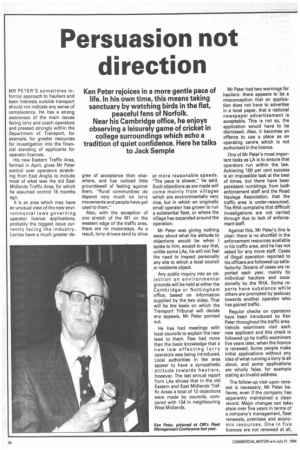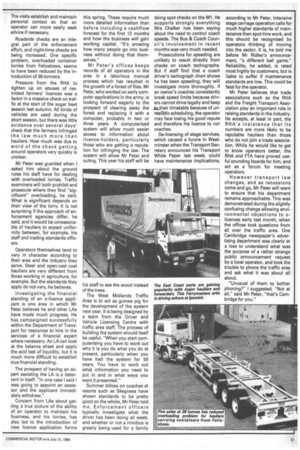Persuasion not direction
Page 48

Page 49

If you've noticed an error in this article please click here to report it so we can fix it.
Ken Peter rejoices in a more gentle pace of life. In his own time, this means taking sanctuary by watching birds in the flat, peaceful fens of Norfolk. Near his Cambridge office, he enjoys observing a leisurely game of cricket in college surroundings which echo a tradition of quiet confidence. Here he talks to Jack Semple
MR PETER'S sometimes informal approach to hauliers and keen interests outside transport should not indicate any sense of complacency. He has a strong awareness of the main issues facing lorry and coach operators and pressed strongly within the Department of Transport, for example, for greater resources for investigation into the financial standing of applicants for operator licences.
His new Eastern Traffic Area, formed in April, gives Mr Peter control over operators stretching from East Anglia to include most of what was the old East Midlands Traffic Area, for which he assumed control 18 months ago.
It is an area which may have an unusual view of the new environmental laws governing operator licence applications, probably the biggest issue currently facing the industry. Lorries have a much greater de gree of acceptance than elsewhere, and has noticed little groundswell of feeling against them. "Rural communities do depend very much on lorry movements and people have got used to them."
Also, with the exception of one stretch of the M1 on the western edge of the traffic area, there are no motorways. As a result, lorry drivers tend to drive at more reasonable speeds. "The pace is slower," he said. Such objections as are made will come mainly from villages which are environmentally very nice, but in which an originally small operator has grown to run a substantial fleet, or where the village has expanded around the operation.
Mr Peter was giving nothing away about what his attitude to objections would be when I spoke to him, except to say that, unlike some LAs, he will not feel the need to inspect personally any site to which a local council or residents object.
Any public inquiry into an objection on environmental grounds will be held at either the Cambridge or Nottingham office, based on information supplied by the two sides. That will be the basis on which the Transport Tribunal will decide any appeals, Mr Peter pointed out.
He has had meetings with local councils to explain the new • laws to them. Few had more than the basic knowledge that a new law affecting lorry operators was being introduced. Local authorities in the area appear to have a sympathetic attitude towards hauliers, however. The last annual report from LAs shows that in the old Eastern and East Midlands Traffic Areas a total of 12 objections were made by councils, compared with 134 in neighbouring West Midlands. Mr Peter had two warnings for hauliers: there appears to be a misconception that an application does not have to advertise in a local paper, that a national newspaper advertisement is acceptable. This is not so, the application would have to be dismissed. Also, it becomes an offence to use a place as an operating centre which is not authorised in the licence.
One of Mr Peter's most important tasks as LA is to ensure that operators run within the law. Achieving 100 per cent success is an impossible task at the best of times, but there have been persistent rumblings, from both enforcement staff and the Road Haulage Association, that the traffic area is under-resourced. The RHA complains that difficult investigations are not carried through due to lack of enforcement staff.
Against this, Mr Peter's line is clear: there is no shortfall in the enforcement resources available in his traffic area, and he has not asked for any more staff. Cases of illegal operation reported to his officers are followed up satisfactorily. Dozens of cases are reported each year, mainly by individual hauliers and occasionally by the RHA. Some reports have substance while others are prompted by jealousy towards another operator who has gained traffic.
Regular checks on operators have been introduced by Ken Peter throughout the traffic area. Vehicle examiners visit each new applicant and this check is followed up by traffic examiners five years later, when the licence is renewed. Some people make initial applications without any idea of what running a lorry is all about, and some applications are wholly false, for example stating an invalid address.
The follow-up visit upon renewal is necessary, Mr Peter believes, even if the company has apparently maintained a clean record. Major changes can takes place over five years in terms of a company's management, fleet renewals, premises and economic resources. One in five licences are not renewed at all. The visits establish and maintain personal contact so that an operator can more easily seek advice if necessary.
Roadside checks are an integral part of the enforcement effort, and night-time checks are being increased. One specific problem, overloaded container lorries from Felixstowe, seems to have been reduced by the introduction of 38-tonners.
Pressure from the RHA to tighten up on abuses of restricted farmers' licences was a factor in a massive check on traffic at the start of the sugar beet season last autumn. All kinds of vehicles are used during the short season, but there was little evidence over several days' check that the farmers infringed the law much more than hauliers. How much was due to word of the check getting around operators very quickly is unclear.
Mr Peter was guarded when I asked him about the ground rules his staff have for dealing with overloaded lorries. Traffic examiners will both prohibit and prosecute where they find "significant" overloading, he said. What is significant depends on their view of the lorry. It is not surprising if the approach of enforcement agencies differ, he said, and it would be unreasonable of hauliers to expect uniformity between, for example, his staff and trading standards officers.
Operators themselves tend to vary in character according to their area and the industry they serve. Steel and open-cast coal hauliers are very different from those working in agriculture, for example. But the standards they apply do not vary, he believes.
Investigating the financial standing of an o-licence applicant is one area in which Mr Peter believes he and other LAs have made much progress. He has campaigned successfully within the Department of Transport for resources to hire in the services of a financial expert where necessary. An LA can look at the balance sheet and apply the acid test of liquidity, but it is much more difficult to establish true financial standing.
The prospect of having an expert assisting the LA is a deterrent in itself. "In one case I said I was going to appoint an assessor and the applicant immediately withdrew."
Concern from LAs about getting a true picture of the ability of an operator to maintain his business, and his lorries, has also led to the introduction of new licence application forms this spring. These require much more detailed information than before including a cashflow forecast for the first 12 months and how the business will gain working capital. "It's amazing how many people go into business without doing that themselves."
Mr Peter's offices keeps records of all operators in the area in a laborious manual process which has resulted in the growth of a forest of files. Mr Peter, who worked on early computer applications in the army, is looking forward eagerly to the prospect of clearing away the forest and replacing it with a computer, probably in two or three years. A computerised system will allow much easier access to information about licence-holders, particularly those who are getting a reputation for infringing the law. The system will allow Mr Peter and outing. This year his staff will be his staff to see the wood instead of the trees.
The West Midlands Traffic Area is to act as guinea pig for the development of the system next year. It is being designed by a team from the Driver and Vehicle Licensing Centre with traffic area staff. The process of building the system should itself be useful. "When you start computerising you have to work out why it is you do what you do at present, particularly when you have had the system for 50 years. You have to work out what information you need to put in and in what ways you want it presented."
Summer blitzes on coaches at resorts such as Skegness have shown standards to be pretty good on the whole, Mr Peter told me. Enforcement officers typically investigate what the driver has been doing all week, and whether or not a minibus is greatly being used for a family doing spot checks on the Ml. He supports strongly everything Mrs Chalker has been saying about the need to control coach speeds. The Bus & Coach Council's involvement in recent months was very much needed.
Prosecutions for speeding are unlikely to result directly from checks on coach tachographs. But if staff find that a coach driver's tachograph chart shows he has been speeding, they will investigate more thoroughly. If an owner's coaches consistently break speed limits because drivers cannot drive legally and keep lia_their timetable because of unrealistic scheduling, the operator may face losing his good repute and therefore his licence to run coaches.
De-licensing of stage services, which caused a furore in Westminster when the Transport Secretary announced his Transport White Paper last week, could have maintenance implications, according to Mr Peter. Intensive stage carriage operation calls for much higher standards of maintenance than spot-hire work, and this should be recognised by operators thinking of moving into the sector. It is, he told me before Mr Ridley's announcement, "a different ball game." Reliability, he added, is rated most highly by customers, but is liable to suffer if maintenance standards are low. This could be fatal for the operator.
Mr Peter believes that trade associations such as the RHA and the Freight Transport Association play an important role in raising standards in the industry. He accepts, at least in part, the RHA's insistence that its numbers are more likely to be reputable hauliers than those who do not join a trade association. While he would like to get to know operators better, the RHA and ETA have proved useful sounding boards for him, and act as a forum for meeting operators.
However transport law changes, and as recessions come and go, Mr Peter will want to ensure that his department remains approachable. This was demonstrated during the slightly confusing change allowing environmental objections to olicences early last month, when the offices took questions from all over the traffic area. One Cambridge newspaper's advertising department was clearly at a loss to understand what was the purpose of a rather strange public announcement request by a local operator, and took the trouble to phone the traffic area and ask what it was about all about.
"Unusual of them to bother phoning?" I suggested. "Not at all," said Mr Peter, "that's Cambridge for you."




















































































